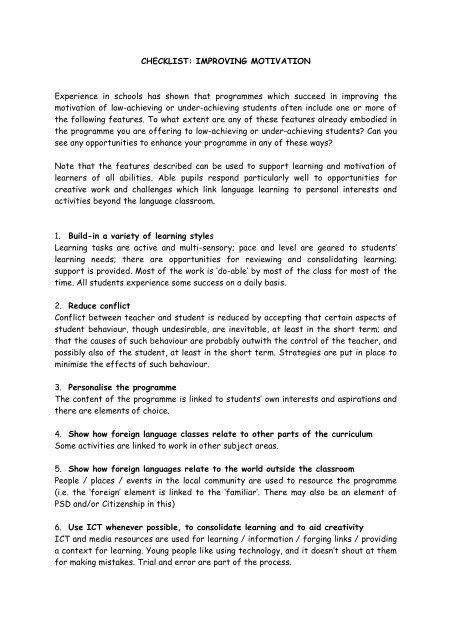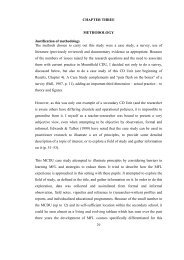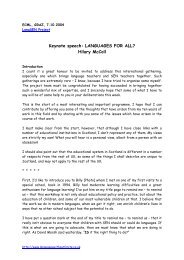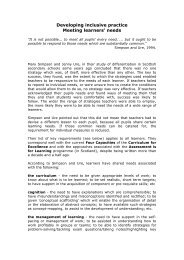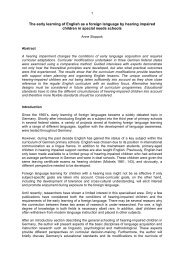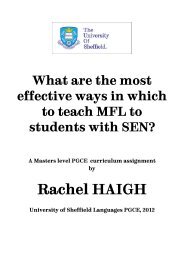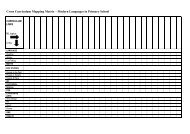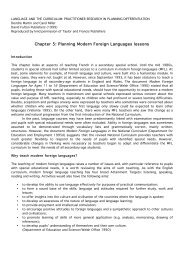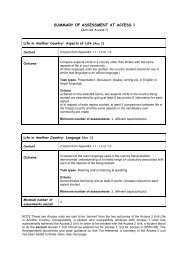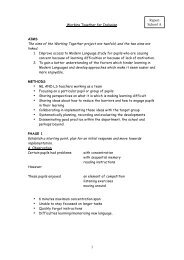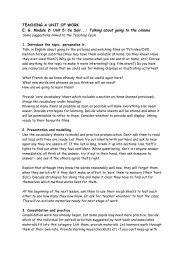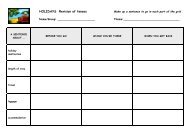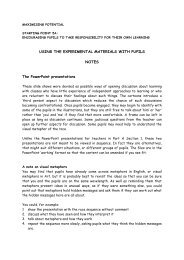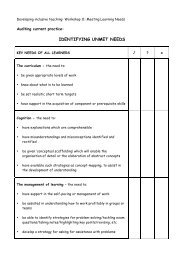CHECKLIST - Languages Without Limits
CHECKLIST - Languages Without Limits
CHECKLIST - Languages Without Limits
Create successful ePaper yourself
Turn your PDF publications into a flip-book with our unique Google optimized e-Paper software.
<strong>CHECKLIST</strong>: IMPROVING MOTIVATION<br />
Experience in schools has shown that programmes which succeed in improving the<br />
motivation of low-achieving or under-achieving students often include one or more of<br />
the following features. To what extent are any of these features already embodied in<br />
the programme you are offering to low-achieving or under-achieving students? Can you<br />
see any opportunities to enhance your programme in any of these ways?<br />
Note that the features described can be used to support learning and motivation of<br />
learners of all abilities. Able pupils respond particularly well to opportunities for<br />
creative work and challenges which link language learning to personal interests and<br />
activities beyond the language classroom.<br />
1. Build-in a variety of learning styles<br />
Learning tasks are active and multi-sensory; pace and level are geared to students’<br />
learning needs; there are opportunities for reviewing and consolidating learning;<br />
support is provided. Most of the work is ‘do-able’ by most of the class for most of the<br />
time. All students experience some success on a daily basis.<br />
2. Reduce conflict<br />
Conflict between teacher and student is reduced by accepting that certain aspects of<br />
student behaviour, though undesirable, are inevitable, at least in the short term; and<br />
that the causes of such behaviour are probably outwith the control of the teacher, and<br />
possibly also of the student, at least in the short term. Strategies are put in place to<br />
minimise the effects of such behaviour.<br />
3. Personalise the programme<br />
The content of the programme is linked to students’ own interests and aspirations and<br />
there are elements of choice.<br />
4. Show how foreign language classes relate to other parts of the curriculum<br />
Some activities are linked to work in other subject areas.<br />
5. Show how foreign languages relate to the world outside the classroom<br />
People / places / events in the local community are used to resource the programme<br />
(i.e. the ‘foreign’ element is linked to the ‘familiar’. There may also be an element of<br />
PSD and/or Citizenship in this)<br />
6. Use ICT whenever possible, to consolidate learning and to aid creativity<br />
ICT and media resources are used for learning / information / forging links / providing<br />
a context for learning. Young people like using technology, and it doesn’t shout at them<br />
for making mistakes. Trial and error are part of the process.
7. Providing a purpose for learning<br />
A specific event or activity in school or in the local community provides a purpose for<br />
learning and a context for using the language learned (e.g. Open Day, European<br />
Awareness, Enterprise activity, Careers, etc.)<br />
8. Learning other things through the medium of the foreign language<br />
The programme is linked to targets on other areas of the curriculum (e.g. core skills,<br />
citizenship, enterprise) or to personal development goals.<br />
9. Is there an end product?<br />
Whenever possible, work is linked to the preparation of an end product the student can<br />
feel proud of and which will be appreciated by others. Some or all of such projects are<br />
produced collaboratively.<br />
10. Link the idea of learning languages to the learner’s own community<br />
The language being learned is perceived by both teacher and students in the context of<br />
language learning generally, so interest in all languages/any language is evident,<br />
especially those which have particular significance to members of the class (home<br />
language, relatives abroad, holidays abroad, inter-school project with a school from<br />
another linguistic area.) Where relevant, this may include acknowledgements of dialect,<br />
regional variation, etc.)<br />
NOTE It’s often easier to turn learners on to ‘languages’ (plural), than to the particular<br />
language he/she is obliged to study. Help them to see the obligatory language as only<br />
one of many, but a good place to start since you have all the resources to make it<br />
interesting. Tell them you’re going to use this experience to show them how to learn<br />
other languages. Encourage them to demonstrate their knowledge of any other<br />
languages and to teach elements of them to the class.<br />
H.McColl 2005


